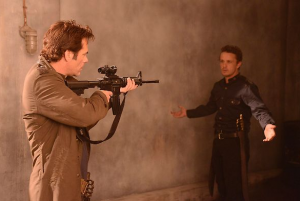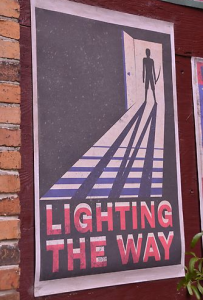Revolution – “Nobody’s Fault But Mine”
“Miles, you’re like a bad penny, man.”
Leave it to Mark Pellegrino to make that line work.
The guard of the Monroe Republic, officers and soldiers alike, have been fed a lot of terrible things over the season but, with casting like Pellegrino, Giancarlo Esposito, and David Lyons masking some terribly cheesy dialogue all season, the swing from the cast of the bad guys to the cast of the good guys is like watching a play on Broadway and stepping out to watch 6th graders act out Book of Mormon.
Maybe that’s a little hyperbolic but you can see what I mean watching this show. It seems unfair of the acting power they have in Philadelphia while Billy Burke Han Solos his way across the countryside, being towed along by Tracy Spiridakos (who has totally mastered that frightful sideglance), Daniella Alonso (honestly, how do you deliver that “Maybe because he tried to kill him line” and not sound like the worst?), Zak Orth (who’s doing okay playing a part that’s perfect for Bad Robot player Greg Gruneberg). It’s not that these people are especially terrible but they’re parts are so cornball and overdramatic that the people playing the whisper-growling, stoic villains get the better end of the weak-writing stick, particularly with their unbalanced strength of cast.
I think that was especially true for this final episode until Sargent Strausser opened his dang, pervy mouth.
They did an okay job earlier this season positioning Strausser as a murderous sociopath in a sea of murderous sociopaths. He was a monster that found a niche in the new world and that’s something I could respect. Good on you, Strausser, for finding a way to utilize that id through useful channels. As far as the audience is concerned, they’re impure and unjust channels but, as a villain, a bloodthirsty man finding success in an evil empire is about all I need to say, “Yeah, he’s a bad guy. Got it.” That’s a good thing.
Instead they decided to make a mess of that villain by adding a rape-y quirk to him. You and I know, as critical viewers of television, that any baddie that suggests anything untoward to the sanctity of a female is bound to suffer revenge or death. It is a tool for immediate abjection. Anyone you might have thought as cool or had any attachment to will be rejected upon saying that a young woman (particularly one with no known sexual history, an assumed virgin) looks like “a peach.”
The thing is that Strausser was neither of those things. He was already a bad guy. But they tipped him over the line to insist that his impending death was necessary. Instead of keeping him just unapologetically indifferent to human life, they decided that he also needs to steal his sex from overpowered women (Rachel provides that his execution was partially for what he did to her). For lack of a better term, it makes him cartoonish, like he’s just a container of conventionally evil flaws, no matter if they seem naturally occurring or not. With so many other well-drawn and nuanced villains, why did Strausser have to die a rapist?
Fortunately, this was just one disappointing aspect in the course of the episode. Aaron and Nora were taken out of it early on to focus on the true drama we needed for the fall finale: Rachel and Charlie reuniting and Miles and Bass reestablishing their differences.
Charlie’s reaction to seeing Rachel for the first time since she abandoned them is surprisingly honest, particularly when compared to Danny’s. Danny greeted his mother he probably couldn’t remember almost with warmth and not as the stranger she should be. Charlie didn’t want to be touched, didn’t allow Rachel to explain herself. That makes sense. Mind you, Charlie and Danny had been told for a years that their mother is dead. Seeing her should be more than a shock. It should be revelatory in a frightening way. Charlie warming up to her was quick but not terribly out-of-place.
I hated the scene where they make Rachel choose to continue working on the amplifier or choose a child to kill. Obviously, with Monroe line after Rachel caves, they wanted to match this scene with Miles taking his own hostage so it was just as important to drawing the parallel between Miles and Bass as it was to give Rachel a reason to continue building the amplifier but, gah, Charlie is annoying.
She regurgitates the qualms Rachel has about providing a militaristic despot with a way to win an arms race, how Monroe will kills thousands, and then tries to sacrifice herself. What would that do, Charlie? Because Monroe would kill you and then let the other two go? It’s absurd and you need to dial down the martyr fantasy.
And to whose benefit is announcing Rachel’s fears to Rachel? Is it for us? Are we so simple that after 10 episodes we don’t understand what Monroe’s intentions are? Maybe you can justify it by saying there’s no way Charlie would know what Rachel already understands. But at least phrase it differently for our benefit so it doesn’t just sound like you’re reminding us of the obvious.
The other part of the episode, the one that supersedes the announced premise of the series (to get Danny back), is the confrontation between Miles and Bass. A good chunk of the episode is littered with flashbacks dating from two boys playing Army in the backyard and creating the militia tattoos they would later use to build their empire to just a couple years before the blackout when Miles confirms himself as Bass’s only remaining family to years after when Bass refuses to leave an injured Miles behind.
This is actually something I like about the series, that the announced premise is different from the actual premise. The hero of the show is clearly Miles even if the story is mostly told through Charlie’s eyes and with her as our central figure of sympathy. His story is bigger than the rescue mission and his meeting with Bass is the Big Bang that blows the whole thing open. Miles establishes that he and Bass are irreconcilable (in kind of a cheesy and harsh way, although I guess Miles did try to kill Bass before so there isn’t a whole lot of love there) which is essentially the end of all affections. In “Kashmir” they create the fear that Miles might fall back in line since living in accordance with the Monroe Republic is easier than fighting against it but it’s dashed quickly. To Miles, Monroe is the certainly the head of the snake that must be killed and, to Bass, Miles is no longer a wayward brother but the infection that could kill him. The actual fight is whatever. The implications of them coming to terms with their feelings, and realizing they’re both too far gone, is far more important.
Even though it sounds like I hated so many parts of this episode, it was overall good for the series and a cliffhanger well-suited for the hiatus. There are a lot of tentacles to consider when it returns:
- Now that Miles has officially cut himself off from The Monroe Republic, is joining the Rebels completely out of the question?
- Will Rachel’s ingenuity (a) raise their overall game in fighting Monroe, (b) create more goals and quests (since she knows a lot more about why the Blackout occurred), and/or (c) inspire some less cheesy story for the good guys?
- Will Danny be useful for anything or will he join Charlie as an unaware antagonist?
- With only one amplifier, does Monroe focus on a hunt for the Matheson insurgency or continue his border wars with Georgia?
The show may actually get interesting.
Other things:
- Yes to the twist to where Charlie hits the guard with grate rather than them both trying to escape through the vent.
- What about that smile on Charlie’s face when Miles ran through the hole? “Run, you idiot.”
- Do you think they’ll be smart enough to start creating traps/alarms that only go off when the amplifier is nearby? That’d be righteous.
- “I’m going to kill you one day for this.” And, from Neville, you believe it.
- November 27, 2012
- Nick
- Episode Review
- Fall Finale, Revolution




